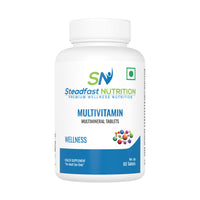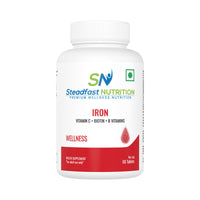What are multivitamins?
Multivitamins are supplements packed with vitamins and minerals, meant to be taken in addition to your daily diet to meet your nutrient needs. Individuals with food allergies, digestive issues, eating disorders, or poor dietary practices may improve their health and well-being by taking multivitamins.
What do multivitamins contain?
The nutrients included in multivitamins can vary depending on the brand and formulation. However, common vitamins found in multivitamins include vitamins A, C, D, E, and B vitamins (such as thiamine, riboflavin, niacin, B6, and B12). Multivitamins commonly include the minerals calcium, iron, magnesium, zinc, and selenium. Some multivitamins may contain other nutrients, such as omega-3 fatty acids or probiotics. The composition of multivitamins can differ significantly between products. Hence, read the label and speak with a healthcare provider before starting any new supplement regimen.
Should We Take multivitamins everyday?
Take a multivitamin capsules everyday to provide your body the nutrients it needs. They’re especially helpful for people who don't eat a balanced diet or who can't get all the nutrients they need from food alone.
The loss of vitamins and minerals in food occurs during cooking. Nutrients are also absorbed more slowly as we age, and people with diseases or disorders that deplete their stores of nutrients may need to take vitamins to bridge the gap between what they consume and what they need to stay healthy.
People with poor eating habits are likelier to lack certain nutrients and vitamins. Vegetarians, especially those who abstain from milk and eggs, may need more iron or B12 if they supplement their diets.
In addition to being a good idea for overall health, taking a multivitamin can help prevent some diseases and conditions. Taking a multivitamin weekly or every other week may help lower your risk of heart disease and certain cancers, such as breast and colon cancer. Multivitamins may also help prevent osteoporosis, macular degeneration, cataracts, and gum disease. Buy Multivitamin.
A balanced diet that includes a variety of fruits, vegetables, and whole grains will provide the necessary vitamins and minerals for good health. However, individuals, such as pregnant women or people with specific dietary restrictions, may benefit from taking a multivitamin supplement under the guidance of a healthcare professional. It is always best to consult a healthcare professional before starting any supplement regimen.
Benefits of Multivitamin
Multivitamins can help bridge the nutritional gaps in individuals who cannot attain daily nutrition. They can provide a variety of benefits to men and women. Some potential benefits include:
1. Meet daily nutrient requirements:
Multivitamins can help us to meet our daily nutrient requirements, which can be challenging to achieve through diet alone.
2. Support overall health:
Multivitamins can provide essential vitamins and minerals to improve overall health and well-being.
3. Reduce the risk of certain health conditions:
Studies have shown that taking a daily multivitamin can help reduce the risk of health conditions such as heart disease and cancer.
4. Improve energy levels and reduce fatigue:
Some multivitamins contain ingredients that can help improve energy levels and reduce fatigue.
5. Improve cognitive function:
Some multivitamins contain ingredients that can help improve cognitive function.
It is pertinent to note that multivitamins should not replace a healthy diet and regular exercise. Always consult a doctor before taking supplements, and carefully read the labels.
Multivitamin tablets for women
Women require multivitamin tablets as they neglect their daily nutrition, leading to calcium and iron deficiency. An increase in the demand for iron during pregnancy and lactation can take a heavy toll.
Many women do not realise that they need extra vitamins until it's too late—and then they have difficulty catching up on their daily nutrition requirements.
Vitamin B complex
Vitamin B complex is a group of water-soluble vitamins that work together to support various bodily functions. This group of vitamins includes thiamine (B1), riboflavin (B2), niacin (B3), pantothenic acid (B5), pyridoxine (B6), biotin (B7), folic acid (B9), and cobalamin (B12).
Vitamin B deficiency occurs when the body lacks the B vitamins required by the body. It can occur due to a diet low in vitamin B-rich foods or any health condition leading to depletion of vitamin B. Our body requires each type of vitamin B in a certain amount to function well. As all B vitamins are water-soluble, they can’t be retained in the body and need to be consumed to avoid any health issues due to deficiency.
Symptoms of vitamin B deficiency include fatigue, numbness, tingling in hands or feet, slow reflexes, and difficulty keeping balance while walking.
Benefits of vitamin B complex:
- Thiamine (Vitamin B1) helps cells convert carbohydrates, fats, and proteins into energy.
- Riboflavin (Vitamin B2) helps turn food into energy for the body’s functioning and helping cells grow, develop, and function.
- Pantothenic acid (Vitamin B5) is necessary for metabolising fats, proteins, and carbohydrates; and is crucial in synthesising hormones and cholesterol.
- Biotin (Vitamin B7 or Vitamin H) helps modify histones, helps in signalling within cells, and regulates genes.
- Niacin (Vitamin B3 or Nicotinic acid) helps in energy production and boosts cardiovascular, skin, brain, and digestive health.
- Folate (Vitamin B9) helps produce red and white blood cells in the bone marrow, DNA, and RNA and transforms carbohydrates into energy.
- Pyridoxine (Vitamin B6) helps synthesise neurotransmitters, red blood cells, and helps in amino acid metabolism.
- Cobalamin (Vitamin B12) helps in nervous system function and DNA and red blood cell production.
Table 1 Nutrient values ICMR-2020 {Source https://www.nin.res.in/rdabook }
|
NUTRIENTS |
ICMR-NIN RDA 2020 (Female) |
ICMR-NIN RDA 2020 (Male) |
|
Calcium (mg) |
1000 |
1000 |
|
Magnesium (mg) |
370 |
440 |
|
Iron (mg) |
29 |
19 |
|
Zinc (mg) |
13 |
17 |
|
Iodine (µg) |
150 |
150 |
|
Thiamine (mg) |
1.7 |
1.8 |
|
Riboflavin (mg) |
2.4 |
2.5 |
|
Niacin (mg) |
14 |
18 |
|
Vitamin B6 (mg) |
1.9 |
2.4 |
|
Folate (µg) DFE |
220 |
300 |
|
Vitamin B12 (µg) |
2.2 |
2.2 |
|
Vitamin C (mg) |
65 |
80 |
|
Vitamin A (µg) |
840 |
1000 |
|
Vitamin D (IU) |
600 |
600 |
|
Vitamin B5 (mg) |
5 |
5 |
|
Biotin (µg) |
40 |
40 |
* Recommended Dietary Allowances (RDA)
Vitamin D
Vitamin D deficiency is prevalent around the globe, with a vast population standing on the deficient side of it. Research suggests approximately 1 billion people worldwide have vitamin D deficiency making it a concern worth pondering. Vitamin D is widely known as sunshine Vitamin as the body synthesises it in response to sun exposure. It helps the body use phosphorus and calcium to strengthen teeth and bones. Vitamin D is a fat-soluble vitamin absorbed with fats in the diet and stored in the body's fatty tissue and liver. Healthcare professionals suggest supplementation (hyperlink to Steadfast D3 supplement) to meet the daily vitamin D requirements for individuals deficient in vitamin D.
Vitamin D3 helps maintain bone health, regulates muscle function, boosts cardiovascular health, improves mood and mental health, and helps prevent cancer.
Take vitamin d capsule under the guidance of a healthcare professional as excess can also be harmful.
Recommended dietary intake of Vitamin D as per RDA, ICMR(NIN-2020)
- Men: 600 IU/d
- Women: 600 IU/d
- Pregnant women: 600 IU/d
- Lactating women: 600 IU/d
Vitamin C
Vitamin C, also known as ascorbic acid, is a natural water-soluble vitamin that plays a vital role in the body- it helps boost immunity, prevents colds and flu, improves skin health, and helps reduce inflammation. Vitamin C is an antioxidant that helps prevent cell damage by neutralising harmful molecules called free radicals, helping your body fight infections and disease-causing bacteria. Vitamin C also supports tissue growth and repair of soft tissues such as your gums or skin. The body requires it to regulate cartilage, teeth, skin, blood vessel, and bone health.
Recommended dietary intake of Vitamin C as per RDA, ICMR(NIN-2020)
- Men: 80 mg/d
- Women: 65 mg/d
- Pregnant women: +15 mg/d
- Lactating women: +50 mg/d
Vitamin A
Vitamin A is a nutrient that helps support the immune system, reproduction, growth, and healthy mucous membranes. It also plays a vital role in vision because it supports the growth and maintenance of rods (that detect light) and cones (responsible for colour perception).
Vitamin A contributes to the health of bones and helps keep your body strong. It is also essential for normal sexual development and reproduction.
Recommended dietary intake of Vitamin A as per RDA, ICMR(NIN-2020)
- Men: 1000 µg/d
- Women: 840 µg/d
- Pregnant women: 900µg/d
- Lactating women: 950 µg/d
Vitamin E
Vitamin E is a powerful fat-soluble antioxidant that can help prevent cell damage by fighting free radicals and preventing oxidation. It improves skin health due to its anti-inflammatory action and helps manage diabetes by increasing insulin sensitivity, decreasing blood sugar levels, and improving circulation. Vitamin E helps prevent heart disease and reduces symptoms of arthritis by reducing inflammation.
The body can't produce Vitamin E independently, so we need to get it from our diet.
Recommended dietary intake of Vitamin E as per RDA, ICMR(NIN-2020)
- Recommendation for Vitamin E: 7.5 – 10 mg per day
Calcium
Calcium is one of the most essential minerals in our body, which helps strengthen bones, clot blood, and improve nerve function, muscle contraction, energy production, and hormone secretion. Including recommended amounts of calcium in your diet can prevent diseases like osteoporosis and rickets. Calcium can help prevent heart diseases by helping lower cholesterol levels and blood pressure.
Recommended dietary intake of Calcium as per RDA, ICMR(NIN-2020)
- Men: 1000 mg/d
- Women: 1000 mg/d
- Pregnant women: 1000 mg/d
- Lactating women: 1200 mg/d
Magnesium
Magnesium helps your body maintain normal nerve and muscle function, keeps heart rhythm steady, supports a healthy immune system, and strengthens bones. It also helps regulate blood sugar and blood pressure levels and supports healthy carbohydrates, protein, and fat metabolism.
Magnesium is also involved in energy production and synthesising nucleic acids and proteins.
Recommended dietary intake of Magnesium as per RDA, ICMR(NIN-2020)
- Men: 440 mg/d
- Women: 370 mg/d
- Pregnant women: 440 mg/d
- Lactating women: 400 mg/d Infants (0-6 m): 30 mg/d
Iron
Iron plays a vital role in energy production, red blood cell production, and oxygen transport. It's also necessary for proper growth, development, and neurological function. Other benefits of iron include muscle development and immune system health. This mineral helps produce white blood cells, which fight off infections and disease-causing bacteria by destroying them before they can cause any damage.
Recommended dietary intake of Iron as per RDA, ICMR(NIN-2020)
- Men: 19 mg/d
- Women: 29 mg/d
- Pregnant women: 27 mg/d
- Lactating women: 23 mg/d
Zinc
Zinc is a trace mineral crucial for many biological functions. It occurs in all living cells and is vital for growth, development, and reproduction. It also plays an essential role in immune system function and the body's response to injury or illness.
Zinc helps balance hormones, including testosterone and those associated with prostate health. Some studies have shown that zinc supplements may help boost the immune system during cold and flu season. It's also thought that zinc may help with symptoms of asthma.
Zinc helps our bodies absorb iron from food, which is especially important for anyone at risk for iron deficiency anaemia (which can lead to fatigue). The human body contains about 1.5 to 4 grams of zinc, of which about 50% is contained within our muscle tissue.
Recommended dietary intake of Zinc as per RDA, ICMR(NIN-2020)
- Women: 13 mg/d
- Pregnant women: 14.5 mg/d
- Lactating women: 14 mg/d
- Men: 17 mg/d
Iodine
Iodine is a trace mineral critical to thyroid hormone production. The thyroid gland needs it to make two main hormones: triiodothyronine (T3) and thyroxine (T4). The body needs these two hormones to regulate its metabolic processes, including heart rate and temperature.
The thyroid regulates several vital processes in the body, including growth, metabolism, brain development, and weight management.
Recommended dietary intake of Iodine as per RDA, ICMR(NIN-2020)
- Men: 150 µg/d
- Women: 150 µg/d
- Pregnant women: 250 µg/d
- Lactating women: 280 µg/d
Can I take Multivitamins daily?
Our diet is the most important survival aspect as it helps replenish the body with crucial daily nutrients. However, we may miss some or the other vitamins and minerals in food, which can lead to an imbalance in the body's functioning. This has led to a vast population in developed countries taking a daily vitamin supplement to avoid diseases such as scurvy (vitamin C deficiency), beriberi (vitamin B1 deficiency), pellagra (vitamin B3 deficiency), and rickets (vitamin D deficiency).
The best part about multivitamin supplements is that they are readily available at the nearest pharmacy and can be easily availed by individuals. Multivitamins are available in many forms, including tablets, capsules, chewable gummies, powders, and liquids.
Eating a nutritious diet and following a good lifestyle is the key to good health. Supplementation is essential to bridge potential nutritional gaps and overcome any health crisis that can be averted before it worsens.
References:
https://www.ncbi.nlm.nih.gov/pmc
https://www.hopkinsmedicine.org
https://www.healthline.com/nutrition
https://www.steadfastnutrition.in/






 Buy Now
Buy Now